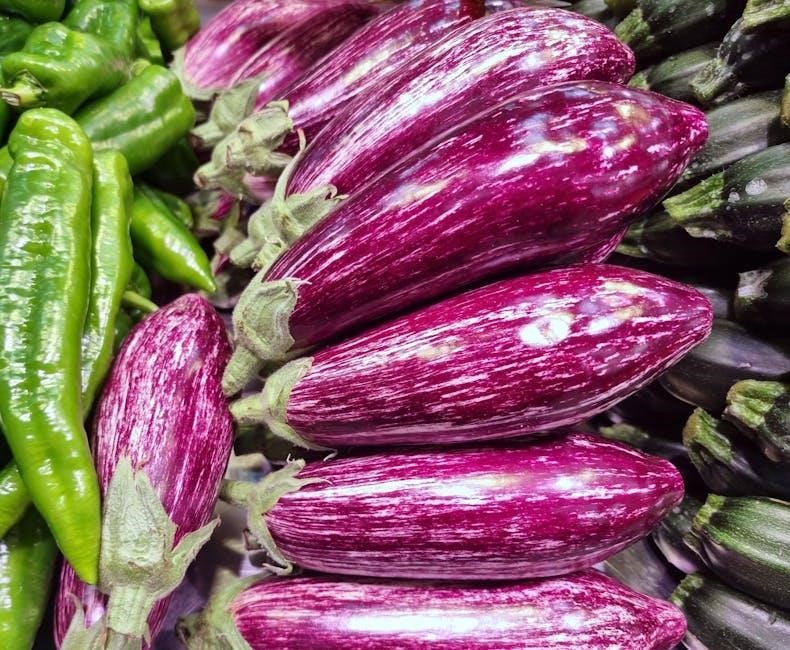A plant-based diet focuses on whole‚ minimally processed foods like vegetables‚ fruits‚ and grains‚ offering numerous health and environmental benefits. Discover how to create a balanced and nutritious meal plan with our downloadable PDF guide‚ packed with essential foods and tips for a sustainable lifestyle.
What is a Plant-Based Diet?
A plant-based diet is centered around whole‚ minimally processed foods derived from plants‚ emphasizing vegetables‚ fruits‚ whole grains‚ legumes‚ nuts‚ and seeds. It minimizes or excludes animal products like meat‚ dairy‚ and eggs‚ focusing instead on natural‚ nutrient-rich ingredients. This dietary approach prioritizes whole foods over processed items‚ offering a balanced and sustainable way of eating. By incorporating a variety of colorful vegetables‚ fiber-rich grains‚ and protein-packed legumes‚ a plant-based diet promotes overall health and well-being. It’s a flexible eating pattern that can be tailored to suit different lifestyles and preferences‚ making it accessible to everyone.

Benefits of a Plant-Based Diet
A plant-based diet offers numerous health and environmental benefits. It reduces the risk of chronic diseases like heart disease and diabetes by focusing on nutrient-dense‚ fiber-rich foods. This dietary approach supports weight management and promotes overall well-being. Additionally‚ plant-based eating is environmentally friendly‚ as it reduces greenhouse gas emissions and water usage associated with animal agriculture. By choosing whole‚ unprocessed foods‚ individuals can also enjoy cost-effective meal options. Embracing a plant-based lifestyle not only enhances personal health but also contributes to a more sustainable future. This makes it a versatile and beneficial choice for individuals and the planet alike.

Core Components of a Plant-Based Diet
A plant-based diet emphasizes whole‚ nutrient-rich foods‚ including vegetables‚ fruits‚ whole grains‚ legumes‚ beans‚ nuts‚ and seeds. These components provide a balanced foundation for optimal health.
Vegetables
Vegetables are a cornerstone of a plant-based diet‚ providing essential vitamins‚ minerals‚ and antioxidants. Dark leafy greens like spinach‚ kale‚ and broccoli are rich in iron and calcium‚ while colorful options like bell peppers and carrots offer vitamin C and beta-carotene. Non-starchy vegetables‚ such as zucchini‚ green beans‚ and tomatoes‚ are low in calories yet high in fiber‚ supporting digestion and satiety. Cruciferous vegetables like cauliflower and Brussels sprouts contain compounds that may reduce cancer risk. Aim to include a variety of vegetables in your diet‚ ensuring a range of textures‚ colors‚ and nutrients. Pair them with herbs and spices for flavorful‚ nutritious meals.
Fruits
Fruits are a vibrant and nutritious component of a plant-based diet‚ offering natural sweetness and a wealth of vitamins‚ minerals‚ and antioxidants. Berries like blueberries‚ strawberries‚ and raspberries are packed with vitamin C and antioxidants that support immune function and heart health. Citrus fruits‚ such as oranges and grapefruits‚ provide ample vitamin C and flavonoids‚ while tropical options like bananas and mangoes offer potassium and fiber. Apples‚ pears‚ and stone fruits like peaches and cherries are excellent sources of dietary fiber‚ promoting digestive health. Incorporate a variety of fruits into your meals for energy‚ flavor‚ and a boost to overall well-being. Aim for seasonal choices to maximize freshness and nutrient content.
Whole Grains
Whole grains are a cornerstone of a plant-based diet‚ providing sustained energy‚ fiber‚ and essential nutrients. Examples include brown rice‚ quinoa‚ oats‚ barley‚ and whole-wheat bread. They are rich in vitamins like B and E‚ minerals such as iron and magnesium‚ and antioxidants that protect against chronic diseases. Whole grains also support healthy digestion and can help manage blood sugar levels. Incorporate a variety of whole grains into your meals to ensure a balanced intake of nutrients. Opt for whole grains over refined versions to maximize nutritional benefits. Pair them with vegetables‚ legumes‚ or nuts for a satisfying and complete meal.
Legumes and beans are protein-rich staples in a plant-based diet‚ offering versatility and nutritional value. They include kidney beans‚ black beans‚ lentils‚ chickpeas‚ and peas. These foods are packed with fiber‚ vitamins‚ and minerals like iron and zinc. Legumes support heart health by lowering cholesterol and blood pressure. They also promote gut health and are low in calories but high in satiety‚ aiding in weight management. Incorporate them into soups‚ stews‚ salads‚ or as a protein source in main dishes. Pairing legumes with whole grains enhances their nutritional profile. They are a key component of a balanced and sustainable plant-based diet. Nuts and seeds are nutrient-dense additions to a plant-based diet‚ providing healthy fats‚ protein‚ and fiber. Almonds‚ walnuts‚ chia seeds‚ flaxseeds‚ and sunflower seeds are popular choices. They support heart health by lowering cholesterol and reducing inflammation. Nuts and seeds are also rich in antioxidants and essential minerals like magnesium and zinc. Sprinkle them on salads‚ blend into smoothies‚ or use as snacks for a quick energy boost. Opt for unsalted and unsweetened varieties to avoid added sugars and sodium. Incorporating a variety ensures a broad range of nutrients. They add crunch and flavor to meals while supporting overall wellness. A plant-based diet reduces the risk of chronic diseases‚ aids in weight management‚ and supports environmental sustainability by minimizing greenhouse gas emissions and resource consumption. Adopting a plant-based diet significantly lowers the risk of chronic diseases‚ such as heart disease‚ type 2 diabetes‚ and certain cancers. By focusing on whole‚ unprocessed foods like fruits‚ vegetables‚ whole grains‚ and legumes‚ individuals can reduce inflammation and improve overall health. The diet’s emphasis on fiber‚ vitamins‚ and antioxidants helps maintain healthy blood pressure and cholesterol levels‚ further reducing the likelihood of cardiovascular issues. Additionally‚ plant-based eating patterns are associated with a lower risk of obesity‚ a major contributor to chronic diseases. By avoiding processed foods and animal products‚ individuals can adopt a lifestyle that promotes long-term health and well-being. A plant-based diet is highly effective for weight management‚ as it emphasizes whole‚ nutrient-dense foods like vegetables‚ fruits‚ legumes‚ and whole grains. These foods are naturally low in calories but high in fiber‚ which promotes satiety and reduces overeating. By avoiding processed foods and animal products‚ individuals tend to consume fewer empty calories‚ leading to a natural calorie deficit. Plant-based eating also supports healthy metabolism and energy levels‚ making it easier to maintain a balanced weight. Incorporating portion control and balanced meals can further enhance weight management‚ helping individuals achieve and sustain a healthy weight long-term. This approach fosters a sustainable lifestyle for overall well-being. Adopting a plant-based diet significantly reduces environmental impact by lowering greenhouse gas emissions‚ deforestation‚ and water consumption. Animal agriculture is a major contributor to these issues‚ while plant-based foods require fewer resources to produce. By choosing whole grains‚ legumes‚ and vegetables‚ individuals support sustainable agriculture and reduce their carbon footprint. This shift also helps preserve biodiversity and reduces pollution from industrial farming practices. A plant-based diet aligns with global efforts to combat climate change and promote eco-friendly living. Making informed food choices can have a profound positive effect on the planet‚ fostering a healthier environment for future generations. A well-organized plant-based diet food list ensures a balanced and nutritious lifestyle. Include essential foods like vegetables‚ fruits‚ whole grains‚ legumes‚ nuts‚ and seeds. Download our PDF guide for expert meal planning tips and grocery essentials to simplify your transition to plant-based eating. A plant-based diet thrives on variety and nutrient-dense foods. Vegetables‚ including leafy greens like spinach and kale‚ broccoli‚ and carrots‚ are rich in vitamins and minerals. Fruits such as berries‚ citrus‚ and apples provide antioxidants and natural sweetness; Whole grains like quinoa‚ brown rice‚ and oats offer sustained energy and fiber. Legumes and beans‚ including lentils‚ chickpeas‚ and black beans‚ are excellent protein sources. Nuts and seeds like almonds‚ chia‚ and flaxseed add healthy fats and texture. Incorporating these foods ensures a balanced and satisfying diet. Our PDF guide offers a detailed list to help you plan meals effortlessly. Effective meal planning is key to maintaining a balanced plant-based diet. Start by creating a weekly schedule‚ incorporating a variety of whole foods like vegetables‚ fruits‚ grains‚ and legumes. Use a food plate model to guide portion sizes‚ ensuring half your plate is filled with non-starchy vegetables; Rotate protein sources such as beans‚ lentils‚ and tofu to keep meals interesting. Prep ahead by batch-cooking staples like brown rice or quinoa. Incorporate healthy fats from nuts and seeds‚ and experiment with herbs and spices for flavor. For inspiration‚ refer to our PDF guide‚ which offers easy‚ nutritious meal ideas for every day of the week. Transitioning to a plant-based diet is a rewarding choice for health and sustainability. For a comprehensive guide‚ download our downloadable PDF to explore essential foods‚ meal plans‚ and tips. Embracing a plant-based lifestyle is a powerful step toward improving health‚ sustainability‚ and overall well-being. With a focus on whole‚ nutrient-rich foods‚ this diet offers a balanced and satisfying approach to eating. Transitioning can be gradual‚ starting with simple swaps like adding more vegetables or trying plant-based protein sources. The key is consistency and patience‚ allowing your body and taste buds to adapt. For guidance‚ our downloadable PDF guide provides a detailed food list‚ meal ideas‚ and practical tips to make the process seamless. Start your journey today and enjoy the transformative benefits of a plant-based diet! Our comprehensive PDF guide is designed to simplify your transition to a plant-based diet‚ offering a detailed food list‚ meal planning tips‚ and essential grocery items. Packed with practical advice‚ it helps you create balanced‚ nutritious meals effortlessly. Whether you’re a beginner or looking to enhance your current diet‚ this guide ensures you never run out of ideas. Download it today and embark on a journey toward better health and sustainability with confidence and clarity. Let this resource be your roadmap to a vibrant‚ plant-based lifestyle.Legumes and Beans
Nuts and Seeds
Health Benefits of a Plant-Based Diet
Reduced Risk of Chronic Diseases
Weight Management

Environmental Impact

Creating a Plant-Based Diet Food List
Essential Foods for a Balanced Diet
Meal Planning Tips
Final Thoughts on Adopting a Plant-Based Diet
Downloadable PDF Guide